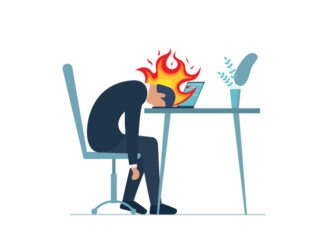
If you find yourself unwell, you may face new stressors and anxieties on top of your physical symptoms – this guide discusses some of the main things to consider if you do find yourself feeling this way
CREDIT: This is an edited version of an article that originally appeared on Education Support
Taking time away from school can be difficult due to the guilt you may feel towards your students and colleagues and the amount of work required to organise cover.
This article discusses some of the main things that you should consider if you are unwell.
Understanding your illness
This is the pivotal first step. It’s important to understand if you are a bit under the weather or if you’re suffering from a chronic illness.
It is also important to ascertain whether you are suffering from physical or mental ill health, or a combination of the two.
Different people respond in different ways to becoming ill; you may experience upset, anger, anxiety or even apathy. You should aim to think calmly about your symptoms and what you can do to reduce them and help recovery from your illness.
Communication with colleagues
Your line manager
Talking to your line manager and making them aware of what’s going on is a vital first step.
Tips for communicating with your line manager if you have a short-term illness:
- Try to explain to them what is wrong (though don’t worry if you don’t feel comfortable giving full details)
- Let them know when you expect to be back at work, if possible
- Remember that you can self-certify for up to seven days, so you may not need medical evidence of your illness
Tips for communicating with your line manager if you have a chronic illness:
- There should ideally be one person who contacts you from the organisation; this will probably be your line manager, but may be an HR representative
- Don’t panic about trying to give any return dates, as you are unlikely to know these and your employer doesn’t need to know at this stage
- Try to keep them updated about your illness – whether it is getting better, worse or staying the same – so that they can plan accordingly
Your team
You may work in a team, such as a department or year group, or you may co-plan with members of your team. It may help to talk to them directly and ensure that they understand what’s going on for you and how to support you as far as you are comfortable.
Tips for communicating with your team if you have a short-term illness:
- Keep it brief – they don’t need to know the details, just that you are unwell
- If it’s feasible to do so, it’s a good idea to pass on as much of the planning, etc. that you have already prepared
- Again, if possible, let your team know where your classes are up to in their curricula, to take the pressure off you providing daily cover work
Tips for communicating with your team if you have a chronic illness:
- Ask yourself how you would support a colleague if they were chronically unwell; you would likely be kind and understanding – it’s not unreasonable to hope for the same from others
- Try not to worry about constantly providing cover work; once your team have got organised with setting this, they will be able to get on with it themselves
- Unless you want to for personal reasons – i.e. because you are friends with team members, – there is no need to keep updating them about your illness
Those you line manage
On the other hand, if you have a TLR or are a member of the Senior Leadership Team, you may also have people you line manager to consider.
Tips for communicating with those you line manage if you have a short-term illness:
- If you are able to, give the people you line manage a list of tasks that have to be done and one of the jobs that can wait for your return
- Also, give these lists to your line manager, if possible, so that they can oversee your colleagues and help out where necessary
- Remember that there is no need to give any details about your illness to those you line manage
Tips for communicating with those you line manage if you have a chronic illness:
- If you can, tell them that you will be away for a while and thank them for deputising for you in your absence
- If possible, provide your second in faculty or deputy head of year with your strategic overview, enabling them to continue with this
- Again, there’s no need to divulge details about your illness; however, it may be beneficial to offer some reassurance as they’re likely to be worried about you
Self-care
Self-care isn’t selfish. It can support your recovery and ultimately help you to return to the classroom sooner rather than later. It’s also important to remember that self-care doesn’t have to stop once you recover from an illness. Ask yourself what habits you can carry forward to help you stay feeling your best.
Diet and nutrition
With any illness, maintaining a healthy, balanced diet is important. Ensuring you have enough vitamins and minerals – mostly gained from fruit and vegetables – will help your body fight off infections and improve your mental state.
Try to reduce your salt and sugar intake when you are ill, as these may slow your recovery. Take on enough fluid – preferably water – to remain hydrated, especially if you are sick or expelling any fluids as part of your illness.
Getting enough sleep
Having sufficient rest and sleep is also significant, whether you are suffering from a physical or a mental illness. Research shows how sleeping well can reduce the likelihood of ill health and help you recover if you are already unwell.
As well as that, it may help to exercise regularly, depending on the type of illness you have. This can range from physical exercise – such as jogging or stretching – or activities that can support your wellbeing like meditation or gentle yoga.
Employers’ responsibilities
To have the best possible conversations with colleagues and reduce any anxiety that arises from uncertainty, it can help to understand the practical responsibilities of your employer.
The government providing regarding sick leave, though specific information will be found within your school’s policies and your contract. Ordinarily, you can self-certify for being off work for illness for up to seven days. If you need to be away from school for longer than that, you will need to obtain a fit note from your doctor stating that you cannot work.
In that case, a Statement of Fitness for Work certificate will be required when you can return. The National Education Union (NEU) also explains the requirements for both the unwell employee and their employer in relation to education professionals being ill.
When returning to work, reasonable adjustments to your working practice should be considered by your school. You may wish to suggest some of these during your return-to-work interview. The government suggests the following adjustments to work following illness:
- Offering a phased return to work, which may mean you are coming in only for the mornings for your first two weeks back, or something similar
- Flexible or part-time working; though a reduction in hours would affect your salary, you may find it beneficial in the short-term to ensure that you are fully over your illness
- Changing equipment, such as having a tinted screen cover for your computer if you have been suffering from headaches
Regarding your pay, there are rules in place about this for teachers. This operates on a sliding scale depending on how long you have been continuously working as a teacher.


Be the first to comment